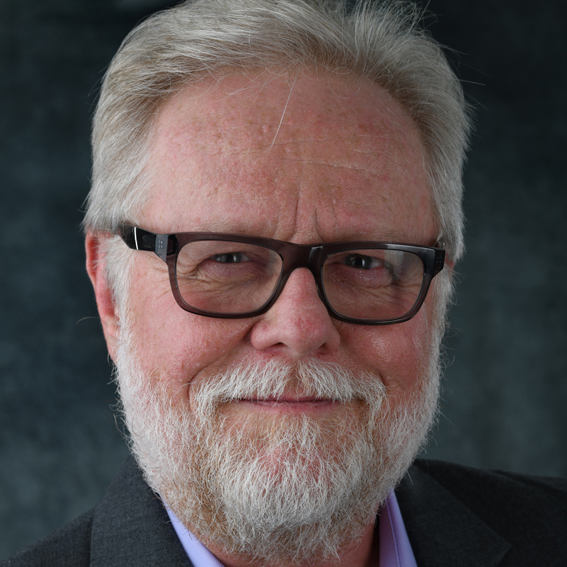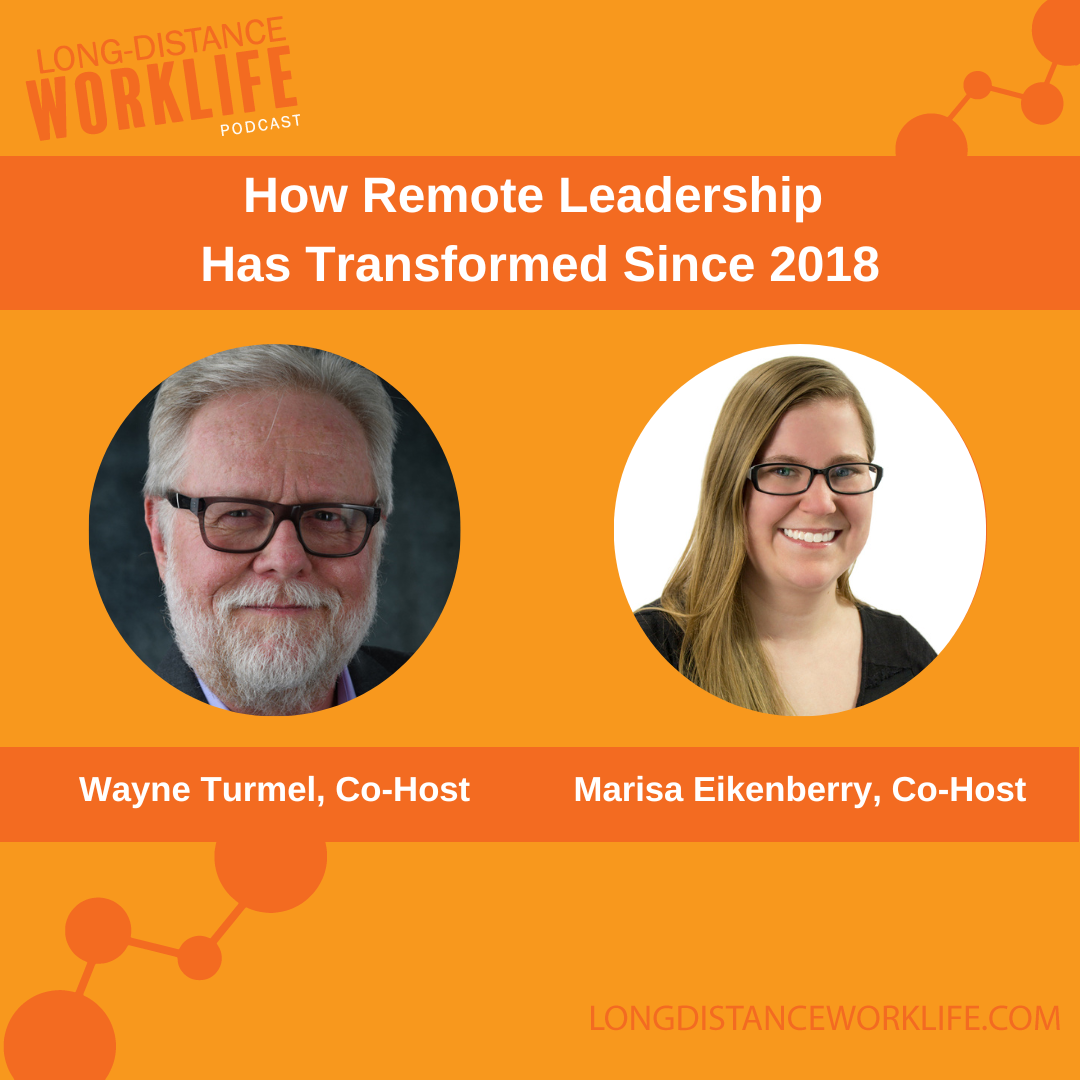Marisa Eikenberry interviews Wayne Turmel and Kevin Eikenberry about their upcoming book The Long-Distance Team, releasing on Feb. 28th. They cover who the book is for, why they chose to define terms like 'team' and 'culture' in the beginning of the book, and how this book fits together with The Long-Distance Leader and The Long-Distance Teammate.
Featured Guest

Name: Kevin Eikenberry
What He Does: Leadership and Remote/Hybrid Work Expert, Speaker, Trainer, Author, Chief Potential Officer of The Kevin Eikenberry Group
Notable: Twice he has been named by Inc.com as one of the Top 100 Leadership and Management Experts in the World and 100 Great Leadership Speakers for Your Next Conference. The American Management Association named him a “Leaders to Watch” and he is among the World's Top 30 Leadership Professionals by Global Gurus. Top Sales World has named him a Top Sales & Marketing Influencer several times, and his blog has been named on many “best of” lists.
Additional Resources
- Learn more about Kevin Eikenberry
- Pre-order a copy of The Long-Distance Team
- Join their FREE book launch event
- The Long-Distance Teammate Anniversary Episode
- Learn more about Wayne Turmel
- Connect with Wayne Turmel on LinkedIn
- Learn more about Marisa Eikenberry
- Purchase a copy of The Long-Distance Leader
- Purchase a copy of The Long-Distance Teammate
- The Remote Leadership Institute
- The Kevin Eikenberry Group
Order The Long-Distance Team
Remote leadership experts, Kevin Eikenberry and Wayne Turmel, help leaders navigate the new world of remote and hybrid teams to design the culture they desire for their teams and organizations in their new book!

00:00:07:22 - 00:00:19:08
Marisa Eikenberry
Welcome back to Long Distance Worklife, where we help you lead work and drive through remote and hybrid teams. I'm Marisa Eikenberry, fellow remote worker. And joining me today are the coauthors of The Long-Distance Team, Kevin Eikenberry and Wayne Turmel.
00:00:19:14 - 00:00:23:07
Wayne Turmel
Hello.
00:00:23:07 - 00:00:25:23
Marisa Eikenberry
Don’t everyone go at once.
00:00:25:23 - 00:00:29:02
Kevin Eikenberry
And you just told me this is your podcast. I'm just following along.
00:00:29:03 - 00:00:29:13
Marisa Eikenberry
All right.
00:00:29:17 - 00:00:32:16
Wayne Turmel
You know what? When it's just the two of us we do fine is all I'm saying.
00:00:33:12 - 00:00:49:14
Marisa Eikenberry
That's for those of you who've been listening to us for a while. You may have heard Kevin's episode with Wayne about returning to office. And today all of us together have the opportunity to chat about your new book that's coming out on February 28, The Long Distance Team. So can you guys tell us a little bit about what the book is about?
00:00:49:20 - 00:01:12:11
Kevin Eikenberry
Well, we didn't talk about who's going to talk about what, so how about I just do that? So the subtitle of the book is Designing Your Team for Everyone's Success, and I suppose that's part of what it's about. The book is really about in in the world of work that is continuing to change. How do we make sure that we're designing teams to get the results we want and creating the culture that we really want?
00:01:12:11 - 00:01:39:14
Kevin Eikenberry
So many people around culture want to think about what would we got one and what we want. And so many books are written about, Here's the culture you should have what you really are approach. Our approach is you should. You should determine the culture that you want. We would call that the aspirational culture, and then we try to help you think about how to create that and then how to move forward to develop and have it even from being a vision to being a reality.
00:01:40:05 - 00:02:07:01
Wayne Turmel
I think what one of the interesting things about the book is the timing, which is largely coincidental. Right? But, you know, it's better to be lucky than good. Sometimes we're at kind of a unique point where people are starting to return to the office from COVID. There's the great resignation, there's audio returned office, there's all this stuff going on.
00:02:07:01 - 00:02:34:19
Wayne Turmel
And what that does is it creates an inflection point, a moment in time where people can actually say, hey, let's think about where we go from here. You know, ordinarily when it comes to culture and making the team do whatever you want it to do, we're so busy doing it that we don't get a chance to stop and ask some questions and maybe make some choices.
00:02:34:23 - 00:02:36:18
Wayne Turmel
And that's what the book is about.
00:02:36:23 - 00:03:05:08
Kevin Eikenberry
And, you know, the interesting thing I would say is for every organization that Wayne is, Wayne is taking off his cranky hat for every organization that's saying, hey, we should step back and really look at this. And this inflection point gives us that time, which is correct. There are organizations that are didn't take that time and are floundering, flailing and frustrated and and this book, I think, can be the antidote to help solve some of that.
00:03:06:04 - 00:03:14:09
Marisa Eikenberry
Yeah. So with that too, like what is the who is the long distance team really for? Is it for the leaders is a for the teammates or is it really a mix of both?
00:03:15:06 - 00:03:15:21
Kevin Eikenberry
Go ahead, Wayne.
00:03:17:12 - 00:03:44:19
Wayne Turmel
You know, it's it's for small l leaders and what I mean by small L leaders is there are big L leaders. Those are the ones with leader in their name tag. I am the VP of this, therefore I am a large l leader. But there are plenty of people in organizations with or without positional authority who desperately want to make their workplace better.
00:03:45:21 - 00:04:05:10
Wayne Turmel
And you know, you can be a teammate by definition if you're a great teammate, you are something of a leader. But this book is really for people who want to understand why their team is what it is and help lay out a plan to make it what it could be.
00:04:06:14 - 00:04:29:07
Kevin Eikenberry
Yeah, one of the things we talk about in the book is, is there to get to cultures. There's the macro culture, the organizational culture that the capital L big L leader culture, if you will, as well as the micro culture or the culture of the intact work team, project team, etc.. And this book is speaking to those details.
00:04:29:07 - 00:04:43:10
Kevin Eikenberry
Right. But but on a big picture level, it can certainly help a big L leader think about this organizationally, but it really does to Wayne's point, get at how can we roll up our sleeves and do the work that's necessary to make this happen?
00:04:43:21 - 00:05:01:16
Marisa Eikenberry
Since we were talking about culture a little bit ago, so in the first couple of chapters of the book, you guys take some time to really define terms like team and culture. And some people listening might be like, These are obvious terms. We know what all of these mean. So why did you decide to spend part of the book defining what a team or what a culture really is?
00:05:02:01 - 00:05:13:21
Wayne Turmel
Oh, I'll take that one. It's because I get a rash when I hear some of those ten hour words. They become buzzwords. Cranky was back.
00:05:15:05 - 00:05:18:09
Marisa Eikenberry
On the show before.
00:05:18:09 - 00:05:25:00
Wayne Turmel
And that being said, culture is really as simple as this is how we do it here.
00:05:25:09 - 00:05:25:16
Marisa Eikenberry
Right.
00:05:26:03 - 00:05:29:15
Wayne Turmel
Right. But that being said, what is it?
00:05:31:04 - 00:05:33:02
Marisa Eikenberry
Right. And it's different for every organization.
00:05:33:12 - 00:05:57:15
Wayne Turmel
What is the thing that we do and how do we do it? And one of the thing I think one of the simple but very powerful things in the book is we break culture this big amorphous blob of a word into three pillars and say, if you think about what makes up a culture, how do you identify a culture?
00:05:58:07 - 00:06:20:14
Wayne Turmel
We call it the three C's. How do you communicate? How do you collaborate? How does the team come together? The word we use is cohesion so that there are three CS and makes it all lovely. But collaboration. Communication and culture. If you can identify those, then you've got a really good shot at defining your culture.
00:06:21:07 - 00:06:28:09
Marisa Eikenberry
Absolutely. And we've talked about that in a previous episode too, and I'll make sure to link to those in the show notes. Kevin, do you have any thoughts on that?
00:06:28:09 - 00:07:01:19
Kevin Eikenberry
You know, just just. Well, I suppose I shouldn't say no and then start talking. I would just say that in part because culture is one of those words that, you know, people who write books talk about, or as is an R word, if you will, that that a lot of people there's misunderstandings around it. And one of the misunderstandings is that, well, we've got the one we've got, and it is or what happened a lot of the last couple of years is we need to get our culture back to where it once was.
00:07:02:03 - 00:07:27:02
Kevin Eikenberry
Right. And so and what we're saying is, why don't you why don't you come to a picture of an aspirational culture that you really want so we can be intentional about it? And again, to Wade's point, using the three C's to help figure out what that actually is like, you've got one, but it might not be the one that serves you best in terms of productivity, in terms of results, in terms of retention, in terms of accountability, in terms like we go around on the list.
00:07:27:11 - 00:07:36:00
Kevin Eikenberry
And so I think one of the big messages of the book is let's be intentional about the one we want rather than living with the one we've got.
00:07:36:13 - 00:07:54:11
Marisa Eikenberry
Absolutely. And I think one of the things that I've also really enjoyed about not only this book, but the content that you guys have been doing for many, many years now is this idea that there is no one culture, there is no one way to do things. It's going to vary by organization. And this is a perfect example of that, which I love.
00:07:55:17 - 00:08:06:14
Marisa Eikenberry
So given all of this, like this is the third book in a series, you know, you've written a book about remote leaders. You've written a book about remote teammates. How do all of these books kind of fit together?
00:08:07:15 - 00:08:08:01
Wayne Turmel
Oh.
00:08:08:07 - 00:08:32:22
Kevin Eikenberry
I'll take that one. So first of all, you know, we we didn't use the word remote. And I know that you know that Marissa Wright, the long distance leader, the long distance teammate in the long distance team. And, you know, it ends up being a series. It wasn't it wasn't meant that way from the start necessarily. And yet the way they're they're hooked together because that's that's the picture of an organization, right?
00:08:33:04 - 00:08:57:11
Kevin Eikenberry
Like, I'm an individual contributor. I'm a leader and we're a team. And so putting the three books together, I think, makes a lot of sense. I think the sort of this sort of finishes the story, if you will, in many ways. I'll say one of the thing, all of them start with the words long distance. And yet we we struggled or we talked is probably better in all three as we wrote them about.
00:08:57:18 - 00:09:14:21
Kevin Eikenberry
And so much of this is the same as when we were all in the same room. And so while all three books certainly talk about the nuances of doing these things at a distance, the principles that under our underneath all three books apply regardless of where your team's located.
00:09:15:00 - 00:09:37:23
Wayne Turmel
I would add something on to what Kevin said, and that is that something has changed since we were a long distance leader. It used to be people were in the office or you had people who were remote and you tried to find a balance and you tried to make it worse work, not worse as you. Dr. going to the front desk.
00:09:37:23 - 00:09:38:05
Marisa Eikenberry
Right.
00:09:39:09 - 00:09:53:23
Wayne Turmel
However, now at this moment in time, we are faced with this new option, which is hybrid work and hybrid work. The thing about a hybrid is it is neither of the parents, Right?
00:09:54:09 - 00:09:54:15
Marisa Eikenberry
Right.
00:09:54:21 - 00:10:19:10
Wayne Turmel
It is actually its own new thing and hybrid work. The thing that makes hybrid work different than being in the office or everybody being remote is the flexibility of time. And when you think about when do we meet and when do we meet and when do we not, and when does it matter that we get people together and when can we do something else?
00:10:19:15 - 00:10:40:16
Wayne Turmel
You're adding this element of time which is going to require everybody to take a good, hard look at how they work right now and how they're going to work in the future. And I think that sense of urgency around figuring out time and when does it need to be synchronous and when can it be asynchronous Is a new wrinkle.
00:10:41:11 - 00:10:58:08
Marisa Eikenberry
Yeah, it's definitely been something I've seen people talk about a lot. I do want to go back a little bit since, you know, I accidentally said, you know, remotely as remote teammates. I do know obviously that the books are long distance leader, a long distance debate. I wish one of you guys would have said something before I said that question, but that's okay.
00:10:58:12 - 00:11:37:00
Wayne Turmel
No, know what? That's important. That's an important distinction. Any time we are in the middle of a change, right, there's the language that we used at the time to do that a little inside baseball people don't care about how our organization works. But one of the things we're doing internally is we are changing the branding and the focus of some of our content to be long distance as opposed to remote because it includes the hybrid and everything in between.
00:11:37:08 - 00:11:59:16
Wayne Turmel
It's not just all remote. It's like at the beginning of COVID, the word was telework. That was the word. That's the word everybody used. And six months later, nobody was using that word. Doesn't mean that it didn't happen and it doesn't mean that people weren't doing the exact same thing we're doing when they were teleworking, But nobody called it that.
00:12:00:00 - 00:12:11:18
Wayne Turmel
And the culture and the language and the terminology is constantly changing. So the fact that you who live in this world all the time.
00:12:11:18 - 00:12:12:04
Marisa Eikenberry
Right.
00:12:12:22 - 00:12:31:16
Wayne Turmel
Right. Are still kind of using certain terminology that can create confusion when you're trying to put a team together. That's why it's so important when you include everybody in the process and make sure everybody's solving the same problem and talking about the same thing in the same way.
00:12:31:22 - 00:12:40:00
Marisa Eikenberry
I know that we're coming up short on our time, but I do just want to ask, is there one takeaway that you hope that readers will take from reading the book?
00:12:40:10 - 00:13:00:23
Kevin Eikenberry
Building a team, Creating accountability, designing a culture are all things that we can do something about. We don't have to live with what we had. We are living in a time when when the world and the world of work is changing. And this is a perfect time for us to be intentional about how we want our organizations and our teams to work in the future.
00:13:01:14 - 00:13:19:01
Wayne Turmel
I think for me, I use a quote in the book, and I know that this is very consultant and very 1970s and it's kind of icky, but it's a great quote. Marshall McLuhan said, I don't know who discovered water, but it wasn't a fish.
00:13:19:01 - 00:13:19:10
Marisa Eikenberry
Okay.
00:13:19:15 - 00:13:48:02
Wayne Turmel
And by that, I mean we live where we live and we don't always see we assume that everything is always like this. And we assume that everybody sees the world the same way we do. And the point of the questions in the book, which are maybe the most powerful thing, is if you ask these questions, you will have a better understanding of what you actually do and how you work.
00:13:48:02 - 00:13:53:05
Wayne Turmel
And that allows you then to say, you know, if we change this, we can do this better.
00:13:53:16 - 00:14:06:19
Marisa Eikenberry
So given that, you know, as as this episode is going to come out in two weeks, you guys will have a book. Do you have any book launch plans or any like celebrations that you're planning on doing as this book comes out?
00:14:07:08 - 00:14:22:01
Kevin Eikenberry
Well, yes, we do. First of all, you've got it on that. You've got it on the on the field of Washington video, long distance team, Booking.com. You can go there, get all the information about bonuses and things we're doing at the launch and special offers and all that sort of stuff. And get your preorder, your copy now and all that.
00:14:22:09 - 00:14:41:00
Kevin Eikenberry
But the book comes out on the 28th of February. On the 27th of February, we're doing an event called Virtual Leader Con dot com. We've done a number of these before. This one is all around issues of teams, cultures in the future of work, which is largely it may well be long distance for you. And so Wayne will be joining me.
00:14:41:02 - 00:14:58:12
Kevin Eikenberry
We've got a number of other guests, experts, authors, etc. joining us throughout the course of the day, completely free to join us for the day. Lots of offers about how you can get the replays and get a bunch of other great stuff, some other bonuses around the book. But you can come join us and we'd love to have you do that.
00:14:58:19 - 00:15:00:19
Kevin Eikenberry
Virtual leader Khan dot com.
00:15:01:09 - 00:15:20:04
Marisa Eikenberry
I want to thank both of you so much for being here and talking with me about this book. I know that we've all been really excited about this book coming out. It's actually part of the reason why we started this podcast was because we knew this book was coming out. So I just and for those of you who are listening, thank you so much for listening to the long distance work life for shownotes transcripts and other resources.
00:15:20:04 - 00:15:40:09
Marisa Eikenberry
Make sure to visit long distance work life dot com if you haven't yet. Subscribe to the podcast so you won't miss any future episodes while you're there. Be sure to like and review. That helps our show reach more teammates and leaders just like you. Feel free to contact us via email or LinkedIn with the links in our show notes and let us know you listen to this episode or even suggest a topic for Wayne and I to tackle in a future episode.
00:15:41:07 - 00:16:12:16
Marisa Eikenberry
If you'd like to learn more about remote teams, preorder Wayne and Kevin's new book, The Long Distance Team. You can learn more about the book at log. It's a long distance team book. Dot com. Thank you for joining us. And as Wayne likes to say, don't let the weasels get you down.



